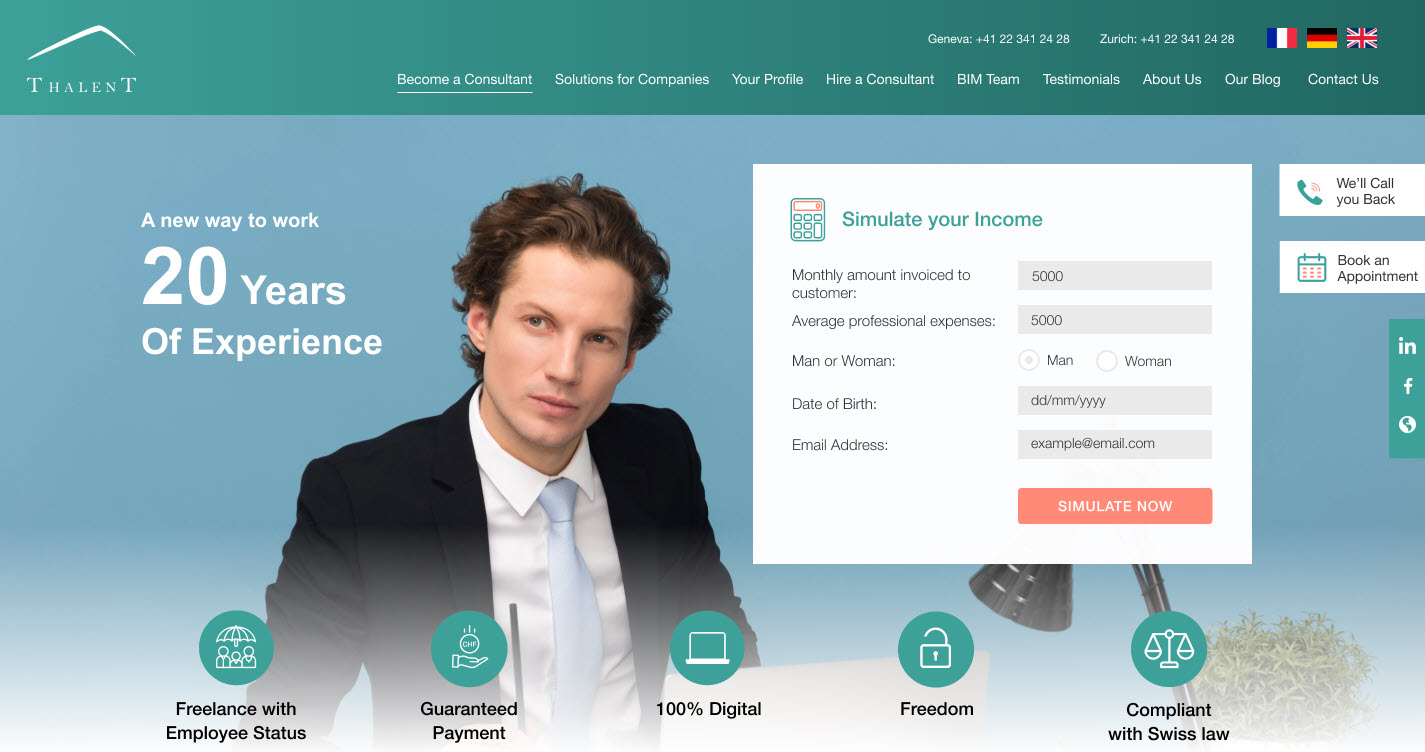Our Blog

What is Payrolling, also called “Wage Portage” in Switzerland? Part 2/2
7. Consultant start and end of contract with Thalent
A. How does a start as a Consultant at Thalent.com go?
Many umbrella companies charge a registration or start-up fee, this is not the case at Thalent SA.
Our onboarding process consists of 3 steps:
- You leave us your contact details and we make an appointment by phone
- One of our experienced managers calls you back for a non-binding professional consultation
- You sign your contract with Thalent.com all digitally
During the consultation our manager will assess
- Your project, your activity
- The state of progress of your contracts
- Your professional situation
He will then send you an email summarising the essential elements with a few documents that will enable Thalent to make you a contract proposal, all in electronic form or by post if you wish.
There are no start-up costs as such and no minimum contract amount.
B. What happens at the end of a contract as a Consultant at Thalent?
At the end of a service or a fixed-term assignment, your employment contract is terminated.
Within the framework of an open-ended assignment, you can resign or discuss the end of your contract with our company.
Everything is done 100% digitally and there are no end of contract fees as such.

8. Client company start and end of contract with Thalent, the solutions
A) How does a service contract to hire external Consultants using Thalent start?
You leave us your contact details and we will arrange a telephone appointment.
Typically we will contact you to discuss your staffing needs.
We define with you the conditions of employment of the consultant(s) chosen by you whether you are a Swiss or foreign company.
We can employ in Switzerland all Swiss and European nationals after having requested the necessary authorisations.
Example: you are a French, English or American company, we can employ the designated person(s) in Switzerland.
You sign a business-to-business contract with Thalent, without having to worry about labour law conditions, and all digitally.
B) What about the duration of the contract for a company?
The duration of the contract can be fixed when it is signed and can be extended very easily with an amendment.
9. How is payrolling, “Wage Portage”, regulated in Switzerland?
Payroll companies operate within a strictly controlled legal framework despite the fact that that there is no law as such that governs wage portage.
It’s a tripartite relationship: the payroll which is also called umbrella company signs an employment contract and a payroll agreement with the freelance Consultant as well a service contract with the "client" company.
The status, which is growing rapidly in Switzerland, is based jointly on the provisions of the Federal Act on Employment Services and the Hiring of Services (LSE/AVG) and the Swiss Code of Obligations (CO/OR).
The LSE/AVG stipulates that "companies that carry out employment service and service leasing activities in Switzerland must apply to the authority of the canton in which they are established for a permit. If they furthermore wish to engage in cross-border activities, they must also have a federal licence issued by the Secretariat for Economic Affairs (SECO)".
Thalent has both a cantonal and a federal licence.
Some of the key elements of the status are as follows:
-The Consultant is looking himself for his clients and has them sign a contract with the payroll or umbrella company
-There is a subordination relationship between the Consultant and the "client" company
-The Consultant may be integrated or not in the "client" company for which the service is provided
-The umbrella company delegates a large part of the management to the "client" company
-The “client” gives instructions to the Consultant taking into account performance objectives
-The Consultant carries out tasks according to a scope of work
-The Consultant is registered as an employee with the OASI (old-age and survivors' insurance).
-The payroll company does not have "know how" of the sector of the Consultant nor work premises for him
-The umbrella company bears the financial risk in the event of default by the Consultant
-The umbrella company may or may not bear the financial risk in the event of non-payment by the client.
-The payroll company assumes an obligation of means and not of result
-The umbrella company hosts the Consultant from an administrative point of view only.

10. A short history of payrolling or wage portage?
New forms of employment and in particular payrolling or wage portage are on the rise all over the world. In Switzerland the trend is also strong, even though standard work employment contracts can be terminated much more easily than in other countries.
Wage portage improves the match between supply and demand.
It meets several of the Consultant's expectations:
- To benefit from a very great autonomy in the "client" relationship
- Provide them with social protection
- Without the hassle of setting up a business
It meets several of the company's expectations:
- It does not increase the wage bill since it involves the purchase of services
- It enables performance and project-oriented work
- For example, consultants can work on a project only for the duration of an assignment
A) In Switzerland
In Switzerland, Thalent SA was a pioneer in developing this new way of working.
The company was founded in 2001 by Pierre Strübin, who is currently Chairman of the Board of Directors, and two other co-founding partners, electrical engineers like himself. The idea came to life after the dismissal of experienced colleagues who had been made redundant as a result of corporate restructuring. However, these people were highly valued and their former clients continued to entrust them with mandates.
Based on an idea already emerging in France, the idea emerged to create a company to serve these clients in Switzerland.
In the German-speaking part of Switzerland, where wage portage is also on the rise, it is called Payrolling, or also Lohnträgerschaft.
In Switzerland, payrolling or wage portage is based jointly on the Federal Act on Employment Services and the Hiring of Services (LSE/AVG) and the Swiss Code of Obligations (CO/OR).
In 2008, a member of the Geneva Grand Council (Grand Conseil) asked the Council of State (Conseil d’Etat) in a question whether it could consider using the tool in the fight against unemployment.
The latter replied that since it was used mainly by men between 35 and 50 years of age and only concerning certain types of jobs and sectors, “it concerned populations that are not representative of the mass of local job seekers. Consequently, although the Council of State is determined to closely monitor the evolution of this way of working, it intends to give priority to the instruments and means currently applied with as purpose the rapid and sustainable reintegration of the local unemployed.”
The Council of State therefore recognised the usefulness of payrolling or wage portage, but arguing that it is only used by a specific part of the population and types of jobs and sectors, refused to promote it in the fight against unemployment. This is still the case today.
B) In France
In France, this way of working was born in the 1980s and was set up by a non profit organisation whose aim was to reintegrate unemployed managers. The latter carried out fixed-term assignments, expertise or consultancy, with companies before being reintegrated into a permanent contract.
In the beginning, mainly senior executives were targeted, but nowadays payrolling has been extended to a large number of jobs and professions.
Accessibility to this way of working has been greatly facilitated by the arrival of new digital technologies.
In France, the system was finally introduced into the Labour Code by Law No. 2008-5s96 of 25th June 2008 on the modernisation of the labour market.
The following translated definition is included: "A set of organised contractual relations between a carrying (payroll, wage portage) company, a carried person (Consultant using the payrolls services, contractor) and client companies which comprises for the carried person (Consultant, contractor) the payroll and the payment of his service for the client by the carrying (payroll, wage portage) company".
In France, it is estimated that in 2020 more than 90,000 people are using this way of working. Source : Catherine Doleux, “Chômage, tous vos droits 2020”.
C) In the United Kingdom
In the United Kingdom, the word Payrolling is used for this way of working. In other European countries the english sentence “Wage Portage” is also sometimes used. A Payroll Company is furthermore commonly called an Umbrella Company.
Since April 2001 when the UK government introduced the "IR35" legislation which creates tests to determine employment status and the ability to make use of small company tax relief, payroll or umbrella companies have become very common. The legislation aims to avoid the non-payment of taxes.
It is estimated that in the United Kingdom in 2020, out of 4'355'000 self-employed people, 400’000 are using an umbrella company. Sources : IPSE, The Association of Independent Professionals and the Self-Employed, bbc.co.uk
Besure to regularly check our homepage and follow us on our social networks for more information regarding payrolling and becoming an independent consultant. If you like our posts we would be thankful if you could give us a like on Linkedin or Facebook!
Author : Kamil Fetouni
-
 Share
Share -
 4y ago
4y ago

What is Payrolling, also called “Wage Portage” in Switzerland? Part 1/2
Have you ever heard of Payrolling, also known as "Wage Portage"?
Payrolling, a service proposed by our Umbrella Company, is booming in Switzerland.
It is a form of employment that offers many advantages for both long-term and short-term contracts and is equally suitable for both:
- Individuals wishing to become freelancers
- Companies wishing to work with staff without having to hire them
It allows you to work in a very flexible way and to reduce administrative, accounting and legal constraints.
It is based on a legal framework that allows a person to be employed by an Umbrella Company which is providing the payroll service such as Thalent.com and to contribute to social insurance while negotiating mandates with clients in a completely autonomous manner.
1. As an autonomous, freelance Consultant:
The main advantage is that you can work as a self-employed person but with the status of an employee and this without having to set up a company.
You benefit from full social security coverage, because you become an employee of the umbrella company but manage your projects and clients in a completely independent way.
- You are fully covered by social security: unemployment insurance, (OASI/DI, AVS/AI, AHV/IV) pension, 2nd pillar LPP, accident insurance, maternity benefit, etc.
- You benefit from paid holidays
- You avoid all the time-consuming compulsory administrative tasks that self-employed workers have to take care of
- You can concentrate on your business without having to worry about accounting, legal and administrative operations
We speak of a hybrid status for the payrolling person who is using wage portage. This way of working can be used by anyone who is entitled to work in Switzerland.
At Thalent.com we call the freelancer who is using our payroll services, a Consultant.

2. As a Swiss or foreign company
If your company is looking to recruit one or more employees for a short or medium-term assignment, payrolling or “wage portage” allows you to:
- Avoid having to increase the number of permanent employees in the wage bill
- Establish service contracts with consultants with expertise that you do not have in-house
- Work with consultants based in Switzerland
- Free you from payroll and employee management tasks
- Reduce the tax costs of your operations
The contractor, or as we call him the Consultant, who is using the payroll service is employed by our Swiss Umbrella Thalent.com and performs a service for you. He does not have the status of a self-employed person and you do not need to hire him.
Thalent.com sends you an invoice at the end of each month for the services performed, which you pay as when you would pay any service company or supplier.
By using external payroll service providers, your company avoids many restrictive and time-consuming administrative procedures and will be able to optimise its project outsourcing strategy.
3. Thalent.com services for the Consultant
These are the services that Thalent.com covers for the consultant :
- Salaried employment contract (fixed-term, open-ended or hourly)
- Invoicing and reminders, VAT management
- Reimbursement of travel and related expenses
- Free advice for customer contracts
- Relations with the tax administration, the inhabitant and working permits office
- Paid holidays
- Withholding tax
- Full social security cover with a choice of options for the LPP pension fund, 2nd pillar :
AHV: Old-age and survivors' insurance
AI: Disability insurance and income compensation benefits
AAP: Occupational Accident Insurance with SUVA and supplementary insurance
AANP: Non-occupational accident insurance at SUVA and supplementary insurance
RC: Adapted professional liability insurance
MUV/AMat/MUV: Maternity allowance
ALV, AC, ALV:Unemployment Insurance
OP/LPP/BVG: Pillar 2 pension fund with a full choice of options among the plans available from the CIEPP Fund of the Fédération des Entreprises Romandes (FER).

4. Contracts and 3 party relationship
Wage portage implies a 3 party contractual relationship:
- The Consultant, the person who is Payrolling and performing the service
- The "client" company
- The Wage Portage or Payroll company, such as Thalent SA for example
This tripartite relationship involves 2 contracts:
- A contract of employment between the freelance Consultant and the Umbrella Company
- A service contract between the “client” company of the freelance Consultant and the Umbrella Company
As a Consultant, you are legally employed by our payroll company and perform services for the "client" company. You receive a salary and Thalent SA pays the social insurances (employee and employer's share) as well as other mandatory charges.
As the “client” company, you are invoiced by the umbrella company which will also take care of all the various administrative tasks on behalf of the Consultant who is using the Payroll services.

5. Salary of the Consultant, treasury, payment of client invoices
As the Consultant, you send the umbrella company at the end of each month an activity report that will serve as the basis for invoicing the "client" company.
The umbrella company will then pay you your net salary which is calculated from the amount invoiced to the "client" company, after deduction of employee and employer charges and deductions regarding withholding tax if applicable.
As for a self-employed person you can calculate your salary using our salary simulator.
The payroll umbrella company receives the payment of the invoices, but Thalent will pay you at the end of the month, before the client has paid his invoice. This means that you receive an advance on your salary because the client has not yet paid.
This cash advance is therefore an advantage, because you do not have to wait for your client's payment to receive a salary.
Not all umbrella companies give this cash advance but with Thalent.com you will benefit from it automatically.
6. Jobs and sectors
Payrolling works well with a multitude of jobs and sectors:
Information Technology
Engineering
Consulting
Linguistics and translations
Environment
Marketing and communication
Home Office, Remote Working
Digital
Quality Control and Quality Assurance
Training
Human Resources
Coaching
Sales and Business Development
Management
Accounting and Fiduciary
You can find the The second part of this article here on our blog.
Besure to regularly check our homepage and follow us on our social networks for more information regarding payrolling and becoming an freelance consultant. If you like our posts we would be thankful if you could give us a like on Linkedin or Facebook!
Author : Kamil Fetouni
-
 Share
Share -
 4y ago
4y ago

- Register for a free and non binding phone interview
- Subscribe free of charge and benefit from all our advantages
- Start your freelance activity
Join Us in 3 Easy Steps
To receive an example of your income, please complete the form below

Welcome to our new website!
We are pleased to present to you our new visual corporate identity and website.
We have made the visual identity more modern and have implemented new functionalities to ease the process of contacting us. We now also offer simple, clear and intuitive ways to find information about our umbrella company and payrolling which is also called wage portage.
The site is now published in 3 languages including on social networks, so we can better cover Switzerland, in particular the Swiss German part.
We also want to address a broader audience of consultants or companies in Switzerland or abroad.
Two of the new features of our new website:
- Our blog which allows us to share with you actualised information on payrolling for autonomous consultants, information about the job market, our news, news from our sector, events, articles on personal development or coaching, on how to develop your business or interviews with consultants.
- Our Hire a consultant profile section that allows you to search in our database of consultants that are available for additional work. You can search by keywords and then contact them through us.
We hope you enjoy browsing through our new website and hope that you will find relevant information.
Please do not hesitate to contact us if you have questions or need specific information about our payroll, wage portage service.
Your Thalent.com Team
Credits:
Kamil Fetouni: Marketing concept, copywriting, Projectmanagement
Mark Streatfield: Visual concept and Design
-
 Share
Share -
 5y ago
5y ago


 4y ago
4y ago 
 4y ago
4y ago 
Share
Link Copied